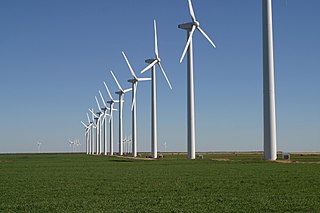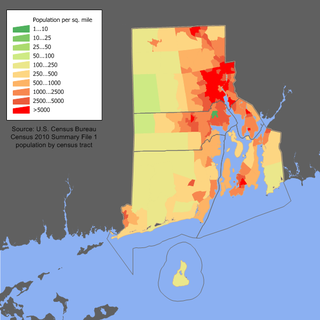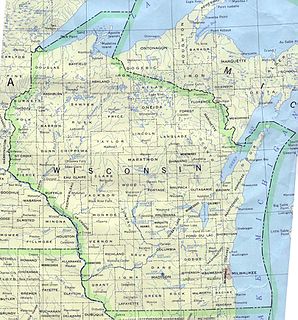
Rhode Island, also known as Aquidneck Island, is an island in Narragansett Bay in the state of Rhode Island, which is named after the island. The total land area is 97.9 km2 (37.8 sq mi), which makes it the largest island in the bay. The 2000 United States Census reported its population as 60,870.
Wind power is a form of renewable energy in Pakistan which makes up more than 6% of the total electricity production in the country. As of 2018, wind power capacity in Pakistan was 1,237 MW. The government is looking to increase the share of renewable energy and plans to add around 3.5 GW of wind energy capacity by 2018.

Wind power in the United States is a branch of the energy industry that has expanded quickly over the latest several years. From January through December 2020, 337.5 terawatt-hours were generated by wind power, or 8.42% of all generated electrical energy in the United States. In 2019, wind power surpassed hydroelectric power as the largest renewable energy source generated in the U.S.

New York ranked 11th in the United States at the end of 2013 for installed wind power capacity, with 1,722 MW installed. In 2016, wind power provided 2.94% of in state energy production. This increased to 3.66% in 2019.
Xinjiang Goldwind Science & Technology Co., Ltd., commonly known as Goldwind, is a Chinese state-owned multinational wind turbine manufacturer headquartered in Beijing, China. Goldwind has deep links to the Communist Party of China and its largest shareholders include Hexie Health Insurance, China Three Gorges Renewables Group, and the National Social Security Fund, all state-controlled corporations. Its founder, Wu Gang, is a long-standing member of Communist Party and was a deputy to the 12th National People's Congress.
Ørsted U.S. Offshore Wind is an offshore wind energy development group that is affiliated with Ørsted, a Danish firm. It is joint headquartered in Boston, Massachusetts and Providence, Rhode Island. As of 2019, it was involved in some of the largest offshore wind farm projects in the United States.

Wind power in Illinois provided 7% of the state's generated electrical power in 2019 powering 1,231,900 homes. At the end of 2019, Illinois had 5,350 megawatts (MW) of wind power installed, ranking sixth among states for installed wind turbine capacity. An additional 1,039 MW of wind power was under construction across the state at the end of 2019.

Blyth Offshore Wind Farm was a small coastal wind farm located 0.5 miles (0.80 km) off the coast of Blyth, Northumberland, England.

The US state of Colorado has vast wind energy resources and the installed electricity capacity and generation from wind power in Colorado has been growing significantly in recent years. The growth has been sustained due to a combination of falling costs, continuing federal incentives, and the state's aggressive renewable portfolio standard that requires 30% of the state's electricity to come from renewable sources by 2020.

Solar power in Rhode Island has become economical due to new technological improvements and a variety of regulatory actions and financial incentives, particularly a 30% federal tax credit, available through 2016, for any size project. A typical residential installation could pay for itself in utility bill savings in 14 years, and generate a profit for the remainder of its 25 year life. Larger systems, from 10 kW to 5 MW, receive a feed-in tariff of up to 33.45¢/kWh.

Wind power in Michigan is a developing industry. The industrial base from the automotive industry has led to a number of companies producing wind turbine parts in the state. The development of wind farms in the state, however, has lagged behind. In January 2021, there were a total of 1,481 wind turbines in the state with a nameplate capacity of 2,549 MW. The nameplate total exceeded 2,000 MW when Pine River came online in March 2019. Wind provided 4.2% of the state's electricity in 2016.

Wind power in Hawaii has the potential to provide all of the electricity generation in the electricity sector in Hawaii. The 114 commercial wind turbines in the state have a total capacity of 206 MW. In 2015, wind turbines produced 6.4% of Hawaii's electricity. In 2017, sources of renewable power were: In 2012, Hawaii generated 367 million kWh from wind power.
Stockyard Hill Wind Farm is a wind farm project under construction in Victoria (Australia). As of June 2020, 1 of a planned 149 turbines was operational and connected to the grid. When it is complete, it is expected to produce up to 530MW, which would be Australia's largest wind farm.

Block Island Wind Farm is the first commercial offshore wind farm in the United States, located 3.8 miles (6.1 km) from Block Island, Rhode Island in the Atlantic Ocean. The five-turbine, 30 MW project was developed by Deepwater Wind. Construction began in 2015 and in late summer 2016 five Alstom Haliade 150-6-MW turbines were erected. Operations were launched in December 2016. It is the largest project using wind power in Rhode Island.

Wind power in Wisconsin started in 1990 with the installation of the Lincoln Turbines wind farm, and contributes to the state's renewable portfolio standard established in 1998. In 2016, Wisconsin had a wind generating capacity of 648 megawatts (MW), responsible for generating 2.4% of its electricity. In 2019, this increased to a capacity of 737 MW, and a 2.63% of generation.
South Fork Wind Farm is a proposed utility-scale offshore wind farm on the Outer Continental Shelf Offshore Rhode Island (RI) which will provide energy to New York State (NY). It will be located in a section of the 97,498 acres (39,456 ha) Wind Energy Area (WEA) OCS-A 0486 16.6 nautical miles-19 miles (31 km) southeast of Block Island and 26 nautical miles-30 miles (48 km) southeast of Montauk Point on the South Fork of Long Island. The project is being built by Ørsted US Offshore Wind in conjunction with Eversource and the Long Island Power Authority.

The Golden Valley Wind Energy Facility is a wind farm in the Amathole District Municipality, built within the wind energy generation zone located in the centre of Bedford, Cookhouse and Somerset East, in the Eastern Cape province of South Africa. The Golden Valley Wind Energy Facility forms part of a cluster of wind generating plants within the wind energy generation zone, and is neighbored by the Nxuba Wind Farm, Cookhouse Wind Farm and Amathole Wind Farm. The wind farm is owned by BioTherm Energy, Letsatsi Trust and the Golden Valley Wind Facility Community Trust - jointly Amstilite (Pty) Ltd - who appointed Goldwind as the EPC contractor for the project. In turn, the EPC contractor appointed Concor to build the civil balance of plant, OptiPower, a division of Murray & Roberts for the electrical balance of plant, and Vanguard for specialized lifting.














